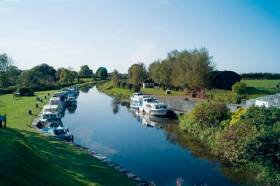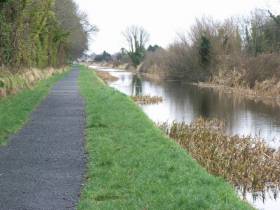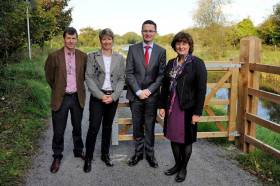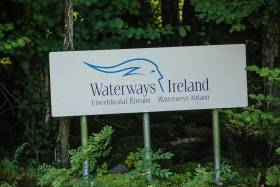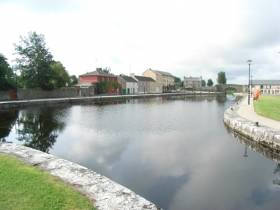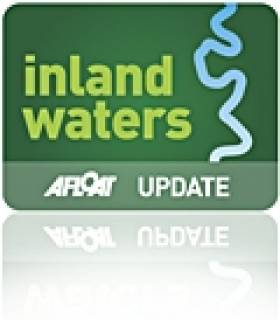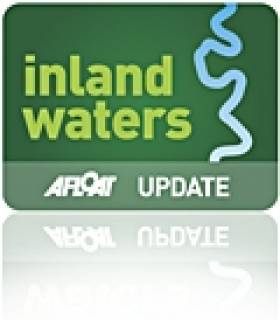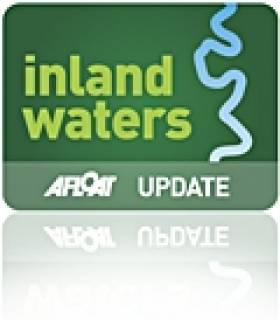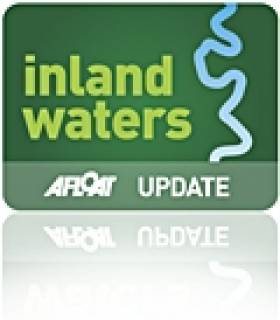Displaying items by tag: Royal Canal
Royal Canal Bicentenary Celebration This Summer
#RoyalCanal - Dun Laoghaire Harbour isn’t the only aquatic attraction in Ireland celebrating a bicentenary this year, as the Royal Canal’s 200th anniversary also takes place this summer.
Waterways Ireland, in association with the Royal Canal Amenity Group, will shortly announce an events programme marking two centuries since the opening of the inland waterway to the Shannon, with festivities set to begin from 27 May.
Royal Canal Towpath Closure In Maynooth Extended Till March
#RoyalCanal - Waterways Ireland advises that the Royal Canal towpath west of Maynooth, Co Kildare from Bond Bridge to Jacksons Bridge, a section of around 1.7km in length, will remain closed until March to undertake further cycle and pedestrian upgrade works along the waterway.
The works form part of the Royal Canal Greenway, which saw an extension in Westmeath from Coolnahay Harbour to the Longford county border opened last October, as previously reported on Afloat.ie.
New Royal Canal Greenway Section Opened In Westmeath
#InlandWaters - The extension of the Royal Canal Greenway in Westmeath from Coolnahay Harbour to the Longford county boundary was officially opened last week.
The new greenway, a 14.4km cycle way, links with the 32.6km already provided along the waterway under an earlier scheme.
Minister of State for Tourism and Sport Patrick O'Donovan joined Cllr Frank McDermott, Cathaoirleach of Westmeath County Council and Waterways Ireland chief executive Dawn Livingstone to officially opened this phase of the cycle way on Friday 7 October.
The aim of the project is to increase the number of walkers and cyclers to the Royal Canal, whether commuting along the Greenway or for recreational purposes.
The project, made possible with funding granted in 2013 and a licence from Waterways Ireland, involved upgrading works and surface dressing on certain sections of the Royal Canal along with informative signage, seating and cycle-friendly gates.
The new cycle path is already in use by both pedestrians and cyclists and is reportedly proving a popular recreational facility in the area.
Canal Passages Into & Out of Dublin Suspended Due to Anti–Social Behaviour
Waterways Ireland is advising masters and owners of vessels that passages into and out of Dublin are presently suspended in light of recent anti-social behaviour which has given rise to safety concerns for boaters and staff alike.
Inspector of Navigation C.J.Lawn says the 'present arrangements are being reviewed' to ensure that there is adequate security to ensure safety for all concerned in order that passages can be resumed at the earliest opportunity.
Clondra Hosts Canoeing Club Championships Next Month
#Canoeing - Richmond Harbour on the Royal Canal in Clondra, Co Longford will be the site of the Canoeing Ireland Club Championships over the weekend of 16-17 April.
As the Longford Leader reports, the event coincides with the second annual Longford Blueway Festival taking place in the town and surrounds.
Up to 500 competitors and their supporters are expected in Clondra for the national canoeing contest which joins a number of events scheduled for the weekend, including cycles and walks of the 10km Camlin Loop of the Shannon Blueway that was launched last year, as previously reported on Afloat.ie.
There will also be public 'taster sessions' on the water for those curious about canoeing whether for sport or recreation. Details are available on the Canoeing Ireland website.
The Longford Leader has more on the story HERE.
Gardai Restrict Boat Movement on the Grand & Royal Canals
Waterways Ireland has been requested by An Garda to limit boat movements on the Royal and Grand Canals in the Kildare area throughout this week from 25 to 31 January, during the course of an on-going investigation, particularly from the Dublin county boundary to Sallins and Maynooth respectively on the two canals.
Waterways Ireland asks that owners and masters abide by this request, and plan boat movements accordingly.
#royalcanal – Spencer Dock Sea Lock at the Royal Canal in Dublin has been closed til further notice due to unforeseen repair requirements at one of the lock gates.
Upcoming Newcomen Bridge Lifts are also cancelled until these works can be carried out.
Waterways Ireland has apologised to customers for inconvenience caused and say they will issue an update notice when further information is available.
Royal Canal: Newcomen Bridge Lift Dates For 2015
#InlandWaters - The schedule of lift dates 2015 for Newcomen Bridge on the Royal Canal in Dublin city centre runs from the end of April till the end of September.
Arrangements have been made for Irish Rail to open the bridge on the following dates and times, if there is demand:
Monday 27 April 11am–1pm
Sunday 3 May 9am–1pm
Saturday 30 May 9am–1pm
Thursday 11 June 11am–1pm
Thursday 9 July 11am–1pm
Thursday 23 July 11am–1pm
Monday 24 August 11am–1pm
Monday 21 September 11am–1pm
The Waterways Ireland Eastern Regional Office requires two weeks' notice from boaters for use of these lifts.
Should there not be demand (a minimum of two boats for passage) for a particular date, Irish Rail will be notified by Waterways Ireland that this lift is cancelled.
A maximum number of boats passing will be implemented to keep to the times given above for the planned lifts (16 for weekend lifts, eight for weekday lifts).
On day of lift, boaters and passengers must follow guidance from Waterways Ireland staff about sequence of passage under the bridge and through Lock 1, and must remain within signed and designated areas.
To give notice of any intended passage of Newcomen Bridge, contact the Eastern Regional Office at 01 868 0148 or [email protected]
IWAI & The Waterways of Ireland – New Book By Brian Cassells
#inlandwaterways – When English writer LTC Rolt made a round trip from the Shannon to Dublin in 1946, traversing the Grand and Royal Canals, he was considered an eccentric. In the 1940s commercial traffic on the canals and rivers of Ireland had dwindled to almost nothing. Rolt's notion that these waterways could be a source of joy to leisure boaters was considered pure whimsy. But it was the book Rolt published after this trip, Green and Silver, that was to act as inspiration for the formation of the Inland Waterways Association of Ireland (IWAI) in 1954.
There were other catalysts, too, that fired up the Association. The swing bridge at Athlone was to be replaced with a fixed span. The Royal Canal had already fallen into disrepair and was closed to navigation. Dublin Corporation proposed to lay a sewer along the Grand Canal and fill it in to make a road. The IWAI determined to oppose the authorities in their attempts to impede and close the network of waterways.
IWAI and the Waterways of Ireland is a celebration of sixty years of the Association doing just that. It begins with a rattle through the waterways themselves – the many rivers, lakes and canals. A short history of the IWAI follows, interesting as much for the names listed at the inaugural meeting as for what was achieved. Two of these were Colonel Harry Rice, retired from the British Army, and Sean McBride, dedicated Republican, politician and Nobel prize winner. Brian Cassells, writer and compiler of this book, comments 'I smile when I think of a dedicated Republican being best friends with a retired Colonel of the British Army.'
This fact says much about the compelling charm of boating in Ireland – it is a great social leveller. The portraits of people include George O'Brien Kennedy, boat designer; Syd Shine, showband leader; Rosemary Furlong, RNLI fundraiser; Jim McGarry, skipper. A diversity of people who were passionate about the rivers and canals, the boats and buildings.
The backbone of the IWAI remains the branches, and these are covered in full. It is the reasons for their creation, and the progress made, that make these descriptions come alive. How local opinion in Kenagh on the Royal Canal was certain it would never be re-opened (it was). Volunteers working on the Lagan Navigation clocking up 11,000 hours to restore Ireland's only flight of four locks. Coalisland branch members who possessed not a boat between them, dedicated to saving their canalside heritage.
The IWAI still has a campaigning role. There are notable successes in the book, given their own special pages – Ram's Island on Lough Neagh, the Royal Canal, and the Boyne Navigation. There is hope for the restoration of the Ulster Canal.
Brian Cassells has put together a book of immense charm, lusciously produced, rich in photographs. There is some repetition of facts, perhaps inevitable in a book with many different contributors. Nonetheless it is a valuable record of, and insight into, an organisation which has been instrumental in safeguarding a network of waterways that is among the most beautiful in Europe.
Inland Waters Notices: Canoe Polo Nationals, Shannon Boat Rally & Lanesborough Swim Race
#InlandWaters - Masters and owners of vessels on the western end of the Royal Canal are advised of navigation restrictions this weekend (Sat 19 and Sun 20 July) during the National Canoe Polo Championships at Richmond Harbour in Clondra, Co Longford.
Traffic management will also be in place in Athlone during the Shannon Boat Rally between Saturday 26 July and Sunday 3 August, with boats transiting from Lough Ree to Shannonbridge towards Ballinasloe during this period.
Masters should allow extra time for lock passage at Athlone when the rally is moving south due to the large number of vessels expected.
Elsewhere on the Shannon Navigation, an open water swimming race will take place from the Bord na Mona railway bridge, some 3km upstream of Lanesborough, to Lanesborough bridge on the August Bank Holiday (Monday 4 August) from 1.30pm to 4.30pm.
All masters and owners are requested to proceed at slow speed with minimum wash when passing this stretch of the navigation and note any advice given by race stewards and safety boat crew associated with the event.


























